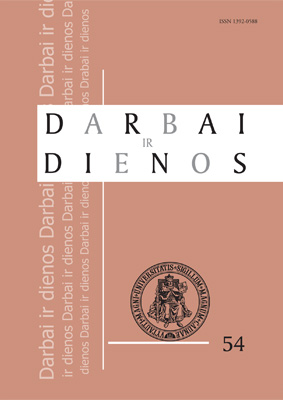Reconstructing History in Latvian Post-Soviet Autobiographical Writing
Reconstructing History in Latvian Post-Soviet Autobiographical Writing
Author(s): Sandra MeškováSubject(s): Cultural Essay, Political Essay, Societal Essay
Published by: Vytauto Didžiojo Universitetas
Keywords: history; autobiography; istorija; autobiografija; Latvija; Latvia
Summary/Abstract: Rethinking Latvian history and national traditions is marked by a constant reshaping of the focus. Autobiography makes it obvious due to the fact that autobiographical narration and personal life-stories are major contemporary means of recasting the accepted master-narratives and ideologies. Studies of diverse modalities revealed in the autobiographical acts of Anita Liepa, Vizma Belševica, and Margita Gūtmane as well as texts by other authors show that, in the early 1990s, there was much emphasis on the testimonial mode of bearing evidence on the history of Soviet occupation which allowed the writers to reveal the truth silenced in the Soviet period and to bring out the continuity of the pre-Soviet and post-Soviet times (this is particularly obvious in Anita Liepa’s autobiographical writing). However, in the mid-1990s other perspectives delineating more problematic aspects of the pre-Soviet and Soviet history of Latvia appeared; they brought in exile stories, as seen in the texts by Belševica, Gūtmane, Nesaule and others. This diversity of stances towards reconstructing history is also present in Latvian fiction created at the turn of the 21st century. Thus Gundega Repše in her novels Ugunszīme (“Fiery Mark”, 1990), Īkstīte (“Thumbelina”, 2000), Alvas kliedziens (“The Tin Shriek”, 2002), and Vara rati (“Copper Carriage”, 2006) and Inga Ābele in her novel Paisums (“High Water”, 2008) reflect on the traumatic experience of history (mostly of the Soviet period), whereas Pauls Bankovskis in his works Padomju Latvijas sieviete (“Woman of the Soviet Latvia”, 2000), Sekreti. Pierobežas romance (“Secrets. A Border Romance”, 2003), and Skola (“School”, 2006) reconstructs the Soviet period of Latvian history from the perspective of the post-Soviet awareness, thus distancing from it and often bringing in an ironic perspective. Paskutiniais dešimtmečiais autobiografinė kūryba Europos, o ypač Rytų Europos, literatūriniame žemėlapyje labai ryški. Tą patį galima pasakyti ir apie šio žanro populiarumą, itin išaugusį po 1990-ųjų, Latvijoje. Be abejo, autobiografinis žanras susilaukė daug literatūros kritikų ir teoretikų dėmesio. Straipsnis nagrinėja problemas, susijusias su istorijos rekonstrukcija postsovietinės Latvijos autobiografiniuose kūriniuose, dviem aspektais. Anitos Liepos autobiografiniai romanai atskleidžia jos išgyvenimus sovietų okupacijos metu ir nutylėtas tiesas per oficialiai priimtą požiūrį. Vizmos Belševicos ir Margitos Gūtmanės tekstai tarsi kontrastas įprastai tų laikų traktuotei, juose atsiskleidžia probleminiai Latvijos istorijos aspektai, išeivių išgyvenimai.
Journal: Darbai ir dienos
- Issue Year: 2010
- Issue No: 54
- Page Range: 143-156
- Page Count: 14
- Language: English

